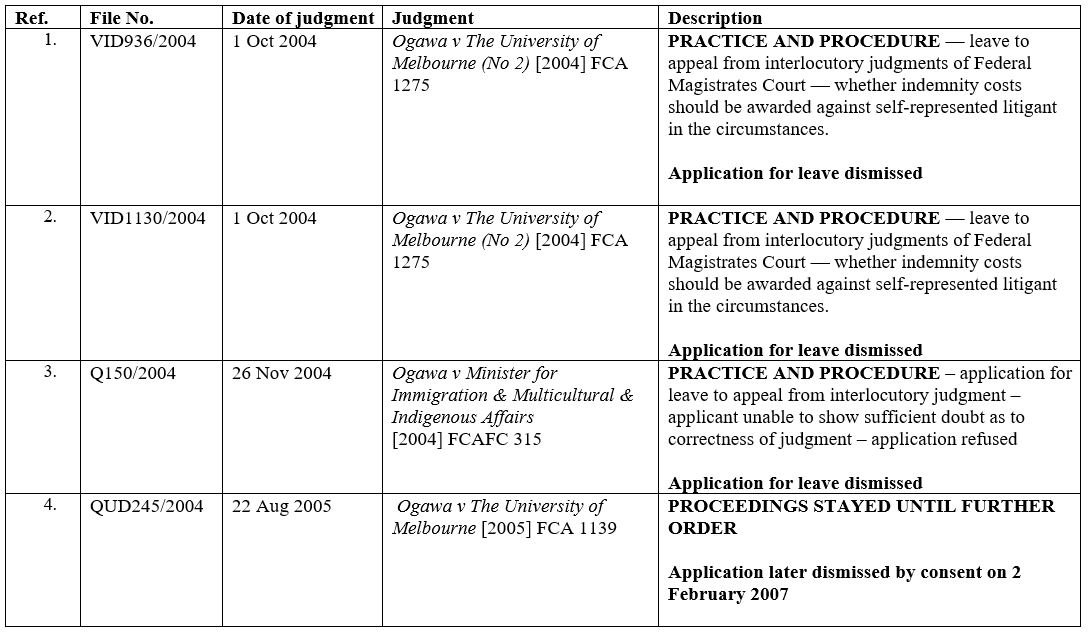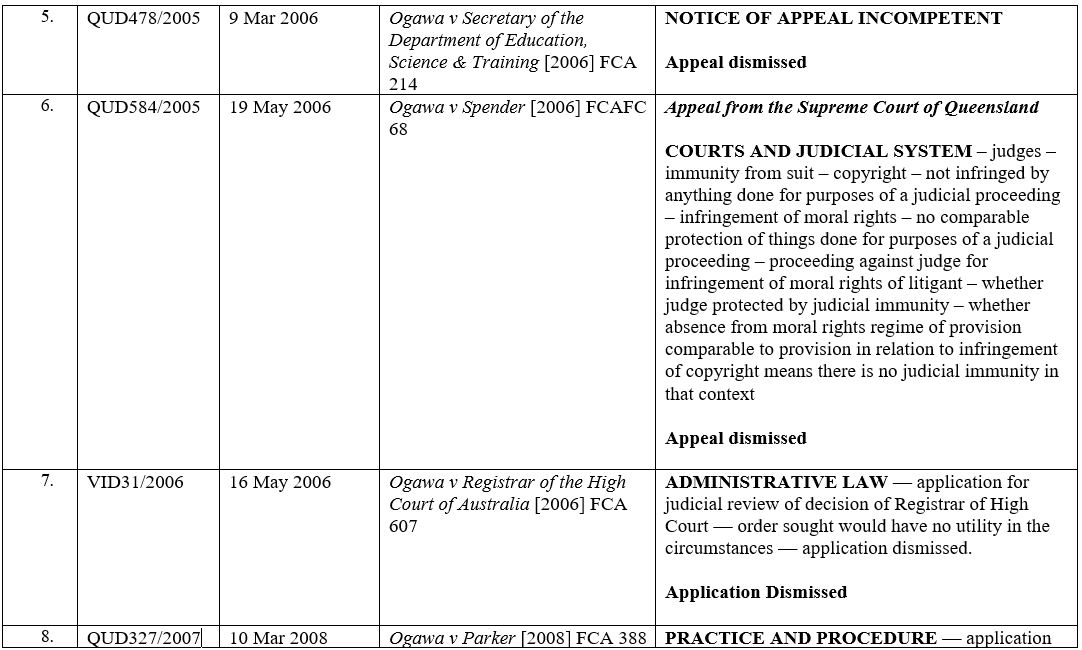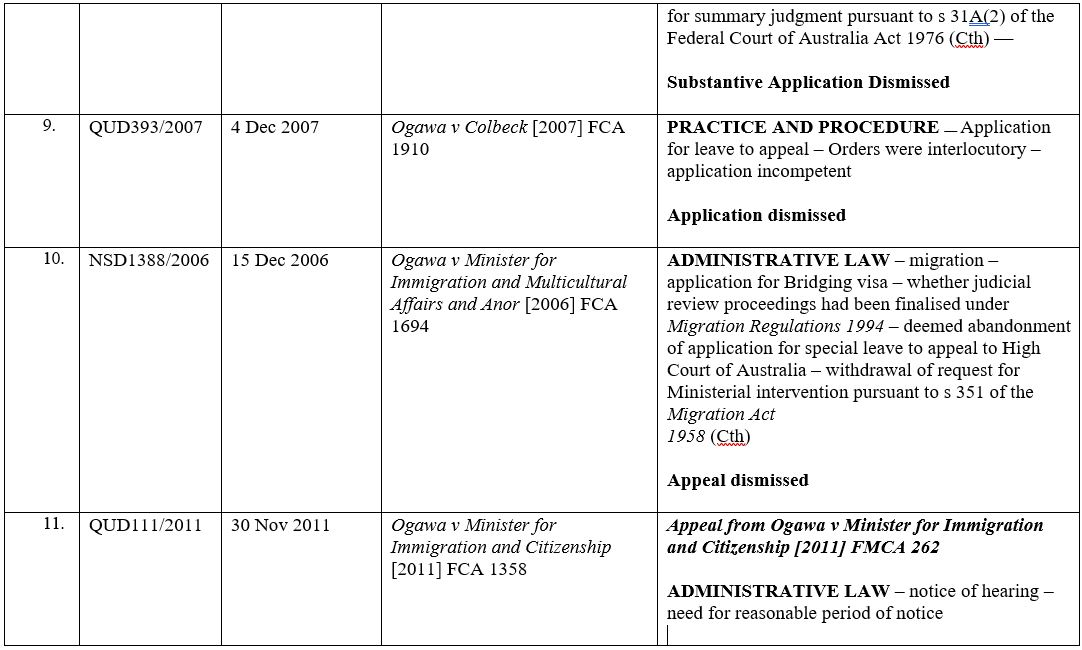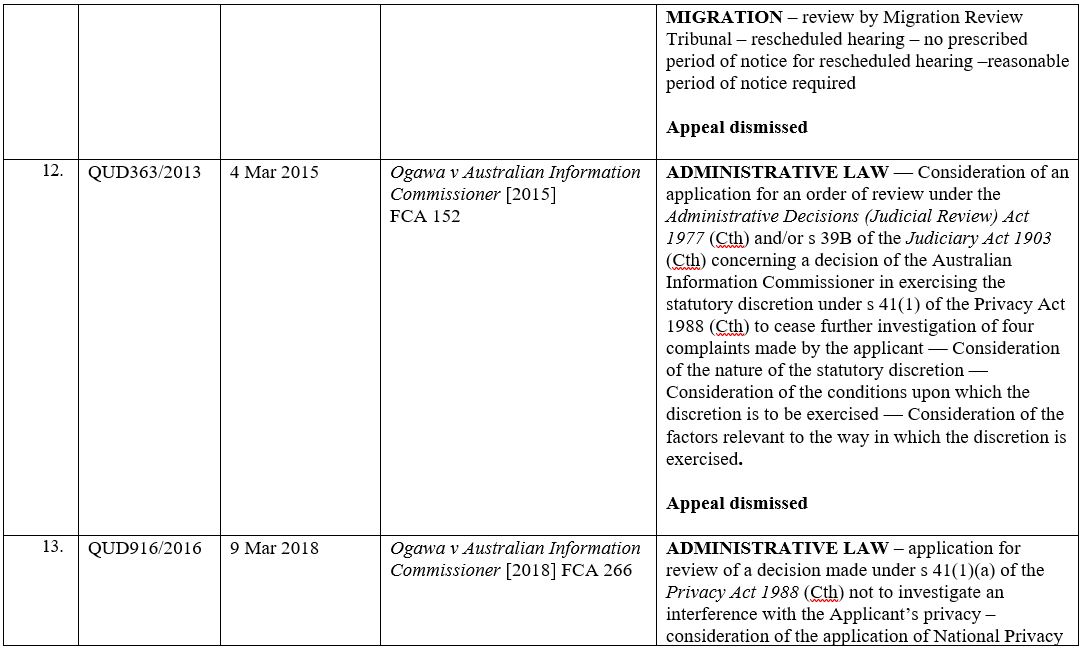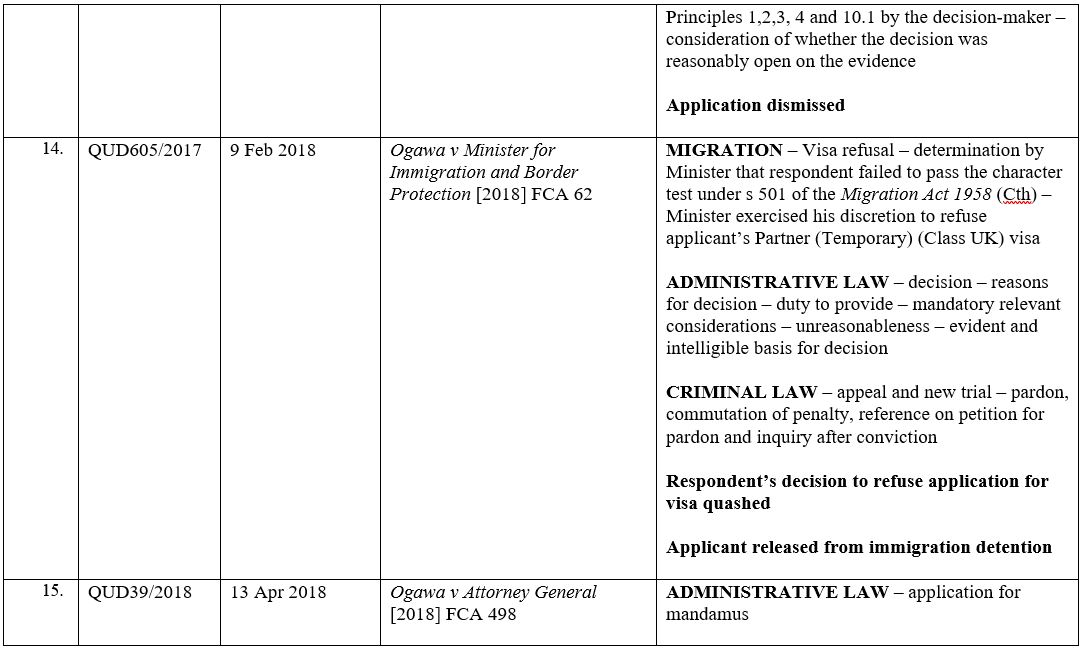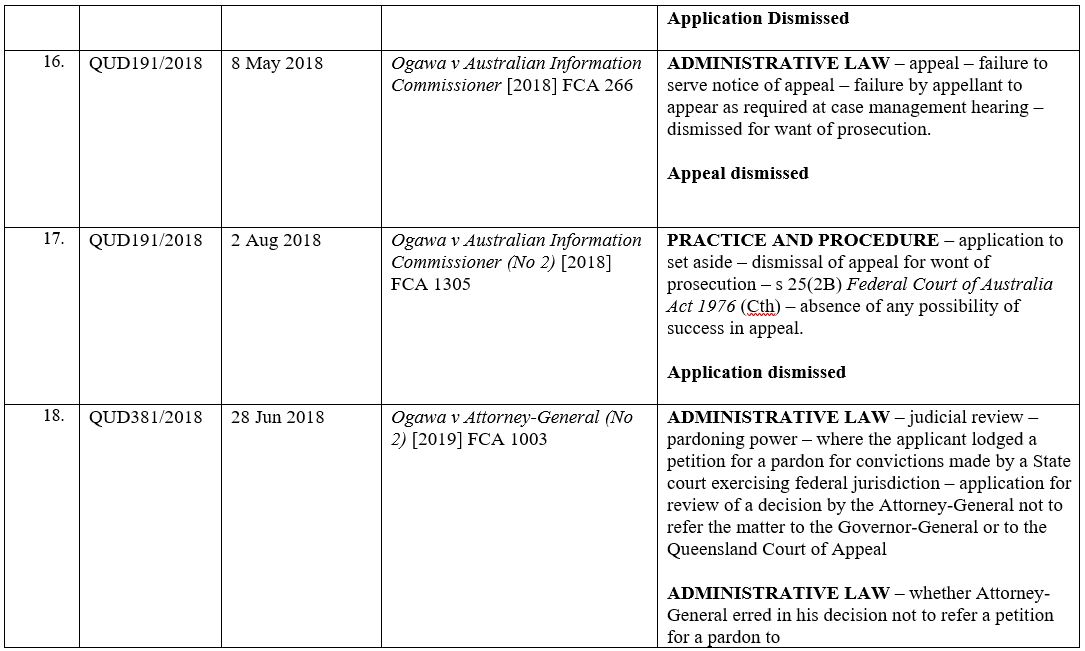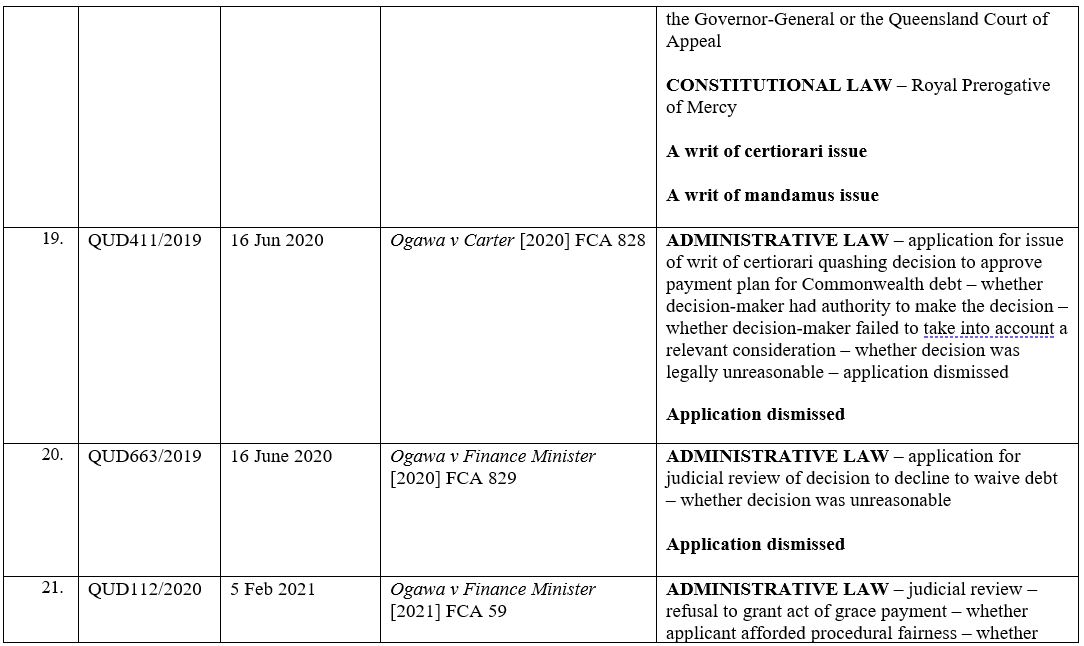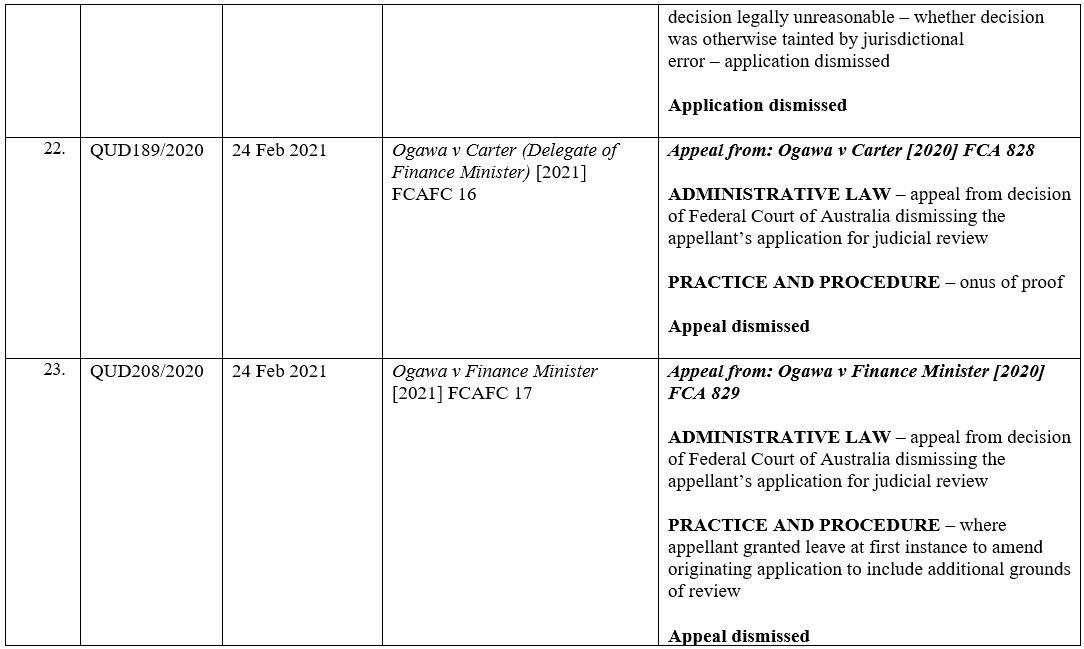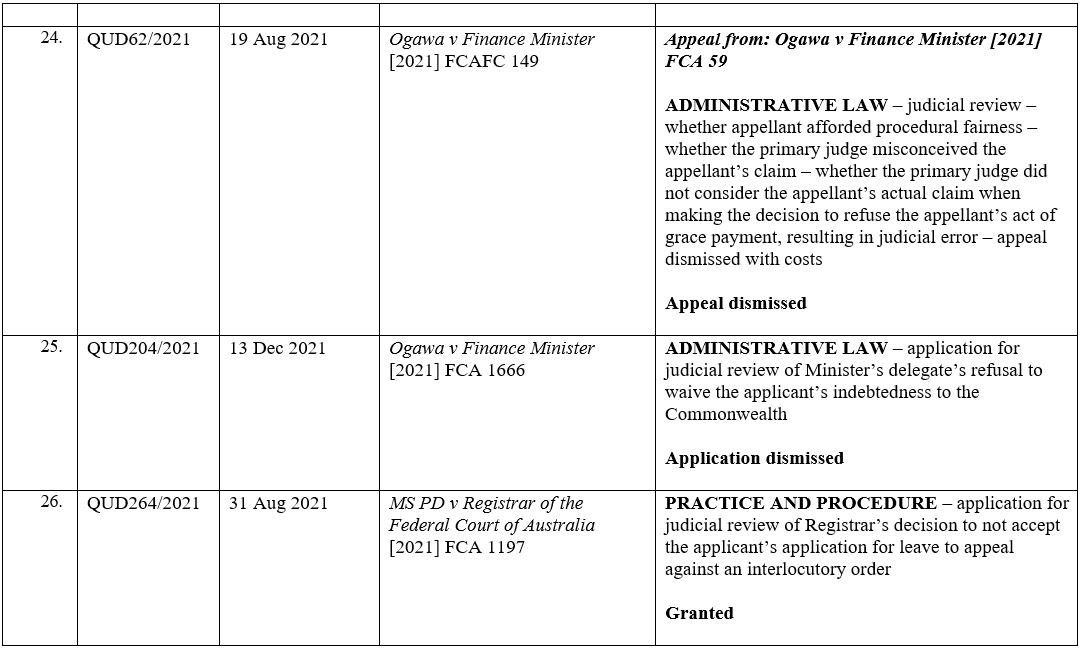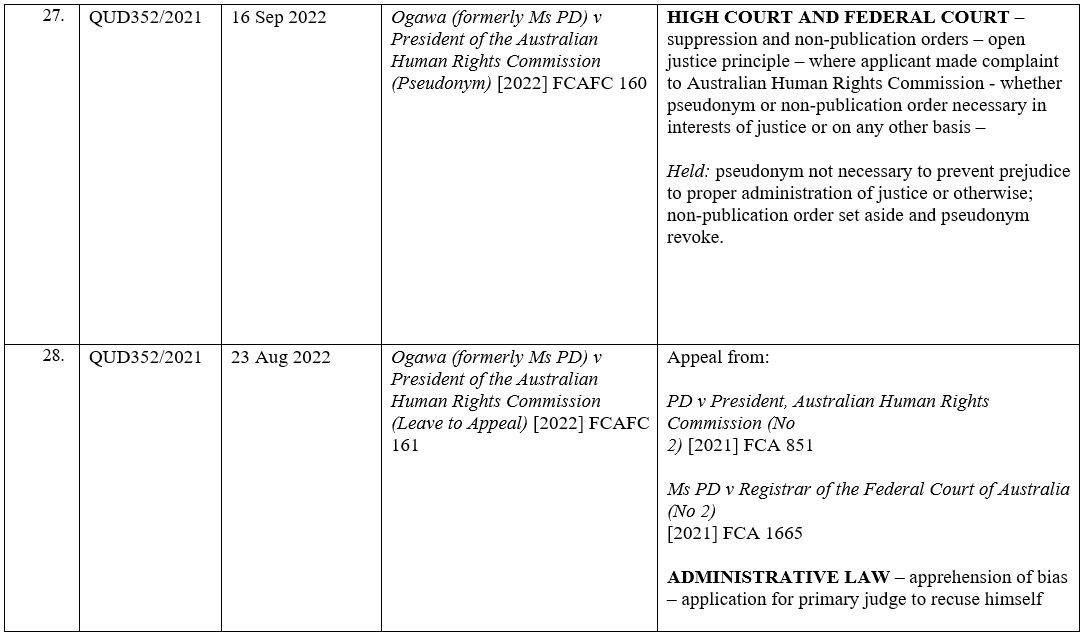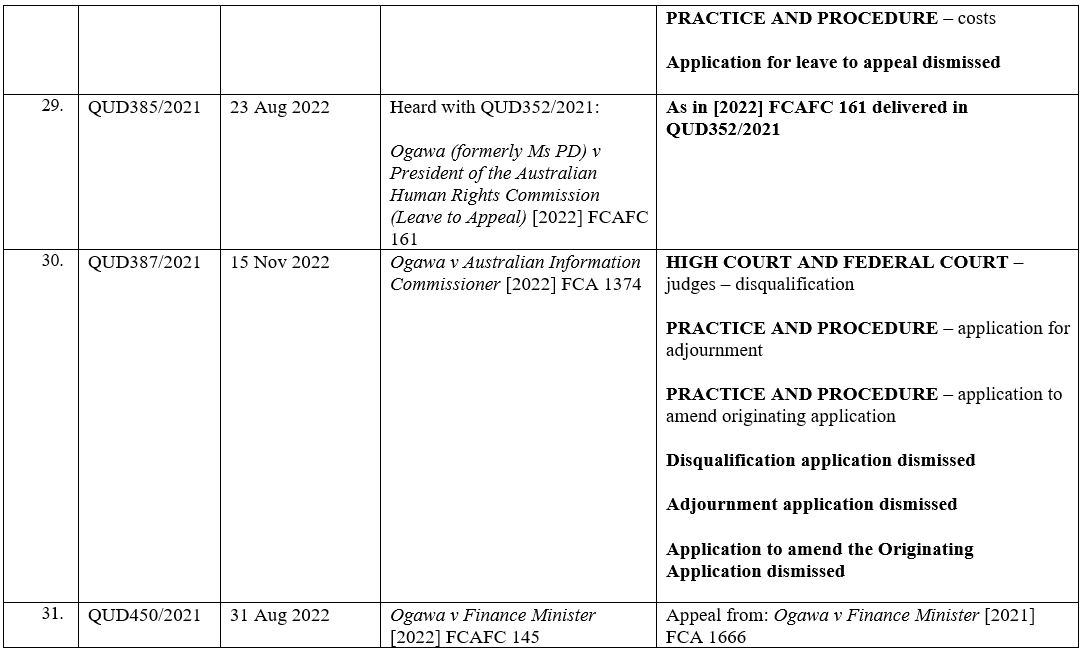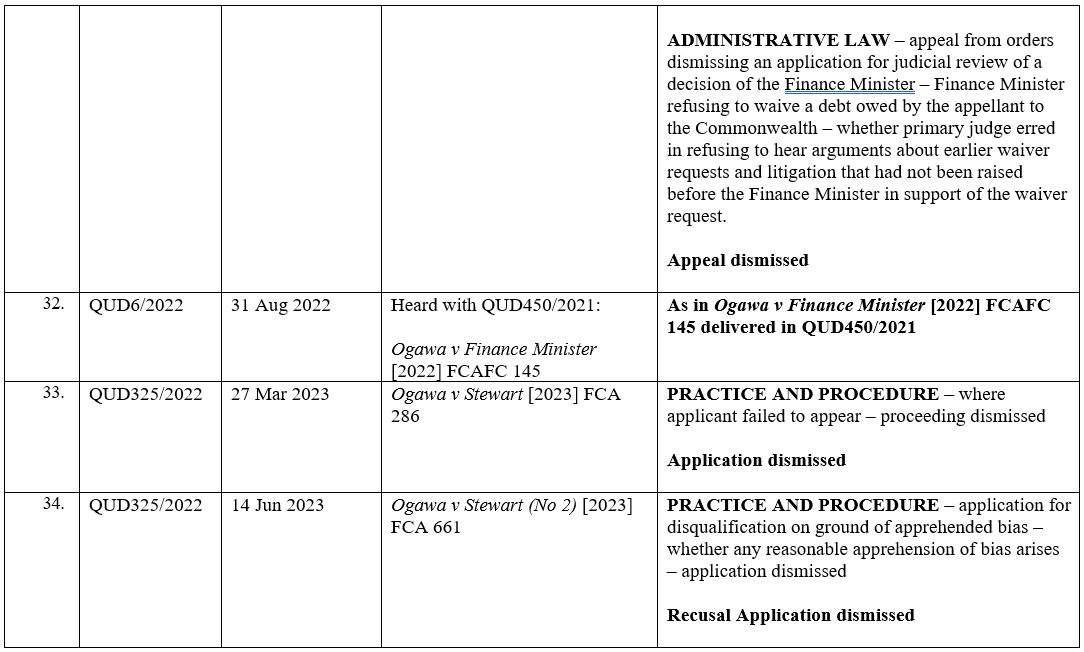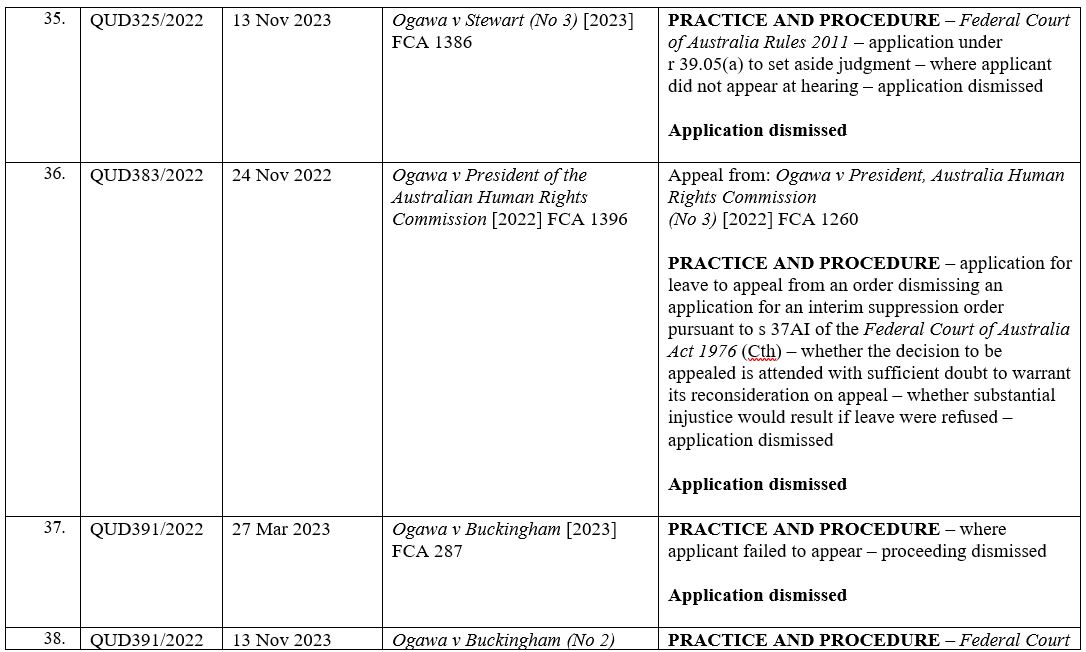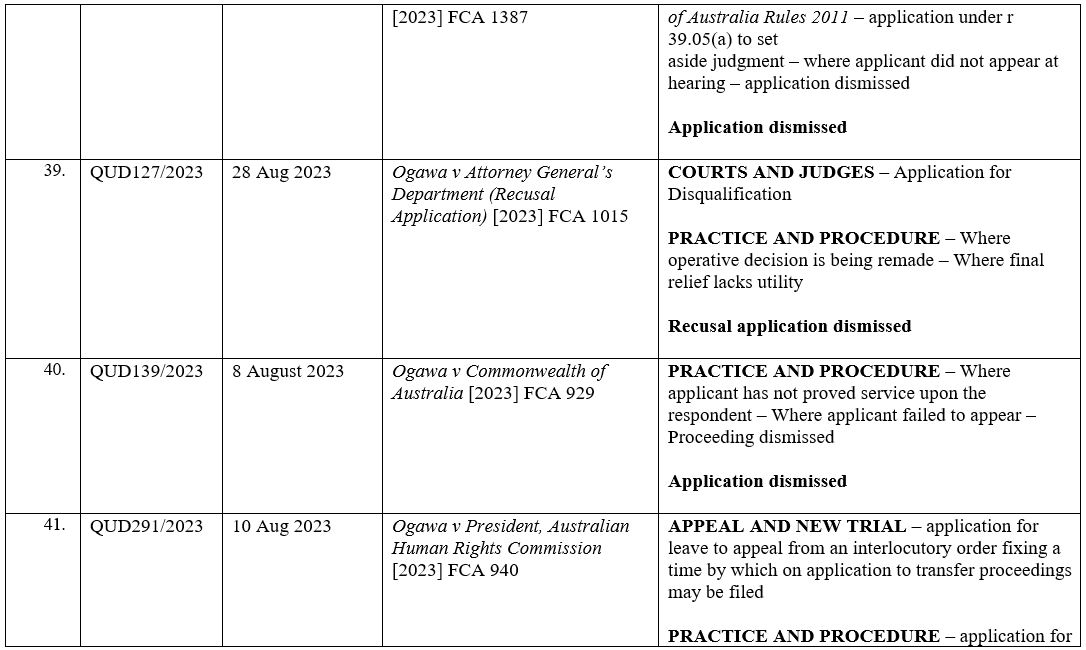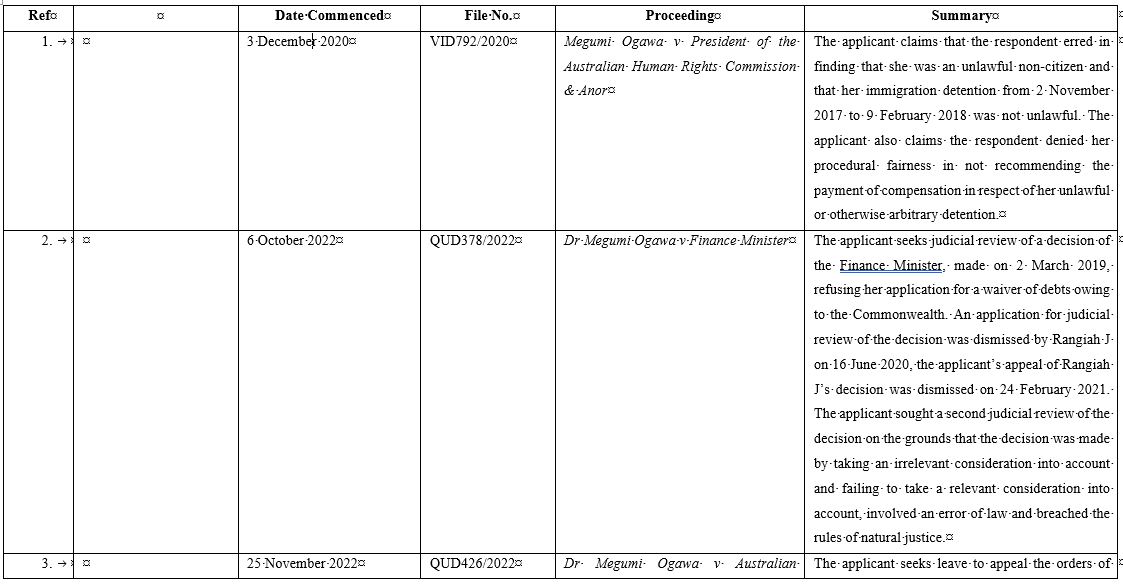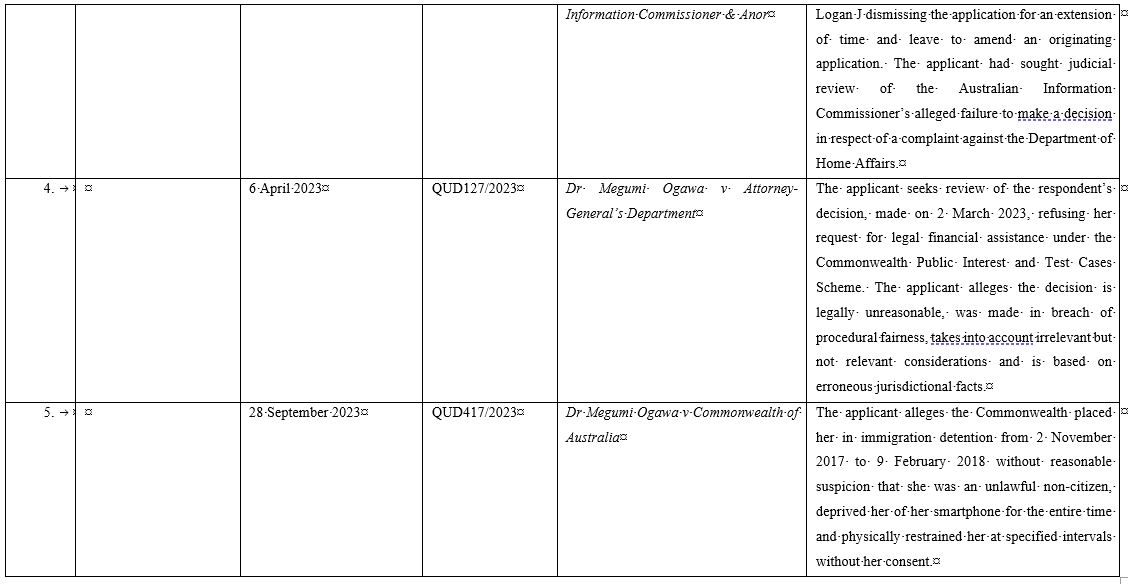Federal Court of Australia
Ogawa v Australian Information Commissioner [2025] FCAFC 37
File number(s): | QUD 386 of 2023 QUD 392 of 2023 QUD 418 of 2024 |
Judgment of: | MCELWAINE, MCEVOY AND JACKMAN JJ |
Date of judgment: | 27 March 2025 |
Catchwords: | PRACTICE AND PROCEDURE — apprehended bias — appeal and applications to extend time and for leave to appeal in three separate matters-where applicant’s claims of apprehended bias were without merit and properly refused in each case — where relief claimed in one proceeding was in any event inutile and claim was correctly dismissed — appeal and applications for leave to appeal each to be dismissed with costs following determination whether the applicant should be the subject of a vexatious proceedings order PRACTICE AND PROCEDURE — Consideration of invoking procedure for making a vexatious proceedings order — where applicant has initiated many matters with little or no merit — where present matters devoid of merit and an abuse of process — orders made facilitating the hearing of whether a vexatious proceedings order should be made in respect of the applicant. |
Legislation: | Administrative Decisions (Judicial Review) Act 1977 (Cth) s 5(1) Crimes Act 1914 (Cth) ss 5ZV, 85ZW, 85ZZA, 85ZZH |
Cases cited: | Bahonko v Sterjov [2008] FCAFC 30; (2008) 166 FCR 415 Branir Pty Ltd v Owston Nominees (No 2) Pty Ltd [2001] FCA 1833; (2001) 117 FCR 424 Charan v Secretary Department of Social Services [2019] FCAFC 134; (2019) 167 ALD 206 Degning v Minister for Home Affairs [2019] FCAFC 67; (2019) 270 FCR 451 Ebner v Official Trustee in Bankruptcy [2000] HCA 63; (2000) 205 CLR 337 Elzain v Deputy Commissioner of Taxation [2024] HCASJ 45 Ferdinands v Registrar Burns [2024] FCAFC 105 Nathan Ltd v Rossington Holdings Pty Ltd [1992] NSWCA 137 Official Trustee in Bankruptcy v Gargan (No 2) [2009] FCA 398 Ogawa v Attorney- General’s Department (Recusal Application) [2023] FCA 1015 Ogawa v Commonwealth of Australia [2023] FCA 929 Ogawa v Finance Minister [2020] FCA 829 Ogawa v Finance Minister [2021] FCAFC 17 Ogawa v Finance Minister [2024] FCA 365 Praljak v State of Queensland [2022] FCA 572 QYFM v Minister for Immigration, Citizenship, Migrant Services and Multicultural Affairs [2023] HCA 15; (2023) 409 ALR 65 Storry v Parkyn [2024] FCAFC 67 |
Division: | General Division |
Registry: | Queensland |
National Practice Area: | Administrative and Constitutional Law and Human Rights |
Number of paragraphs: | 85 |
Date of hearing: | 18 March 2025 |
Counsel for the Appellant in QUD 386 of 2023, QUD 392 of 2023 and QUD 418 of 2024 | The Appellant appeared in person |
Counsel for the Respondent in QUD 386 of 2023 | Ms S Amos |
Solicitor for the Respondent in QUD 386 of 2023 | Holding Redlich |
Counsel for the Respondent in QUD 392 of 2023 | Ms R Berry |
Solicitor for the Respondent in QUD 392 of 2023 | Moray & Agnew |
Counsel for the Respondent in QUD 418 of 2024 | Mr M Maynard |
Solicitor for the Respondent in QUD 418 of 2024 | Australian Government Solicitor |
ORDERS
QUD 386 of 2023 | ||
| ||
BETWEEN: | DR MEGUMI OGAWA Appellant | |
AND: | AUSTRALIAN INFORMATION COMMISSIONER Respondent | |
order made by: | MCELWAINE, MCEVOY AND JACKMAN JJ |
DATE OF ORDER: | 27 March 2025 |
THE COURT ORDERS THAT:
1. Following the determination of the process timetabled at orders (2) – (6), the appeal be dismissed and the appellant pay the respondent’s costs.
2. By 4:00pm on 24 April 2025, Dr Ogawa is to file any affidavit material and/or submissions on which she intends to rely to oppose an order (proposed order) being made in the following terms: Pursuant to s 37AO(2) of the Federal Court of Australia Act 1976 (Cth) (FCA Act), Dr Megumi Ogawa be prohibited from instituting proceedings in this Court without making an application for leave to institute proceedings in accordance with s 37AR of the FCA Act and that all current proceedings instituted by her be stayed until further order.
3. By 4:00pm on 24 April 2025, Dr Ogawa is to notify the registry in writing as to whether she wishes to have an oral hearing in relation to whether the proposed order ought to be made by the Full Court and, in the absence of such notification, the issue as to whether the proposed order ought to be made be dealt with on the papers by the Full Court.
4. By 4:00pm on 9 May 2025, in the event that an amicus curiae is appointed to assist the Court in connection with whether the proposed order ought to be made, the amicus curiae is to provide to the registrar any material including submissions, who will then provide copies to Dr Ogawa and to the Full Court.
5. In the event that an amicus curiae is appointed, Dr Ogawa may file and serve any submissions in response to those of the amicus curiae by 4:00pm on 23 May 2025.
6. Any oral hearing in relation to the making of a vexatious proceedings order is to be listed for hearing by the Full Court on a date to be fixed, not earlier than 30 May 2025.
Note: Entry of orders is dealt with in Rule 39.32 of the Federal Court Rules 2011.
ORDERS
QUD 392 of 2023 | ||
BETWEEN: | DR MEGUMI OGAWA Applicant | |
AND: | ATTORNEY-GENERAL’S DEPARTMENT Respondent | |
order made by: | MCELWAINE, MCEVOY AND JACKMAN JJ |
DATE OF ORDER: | 27 March 2025 |
THE COURT ORDERS THAT:
1. The application for an extension of time lodged on 12 September 2023 for leave to appeal the orders made on 28 August 2023 is granted.
2. Following the determination of the process timetabled at orders (2) – (6) as made in proceeding QUD 386 of 2023, the application for leave to appeal be dismissed and the applicant pay the respondent’s costs.
Note: Entry of orders is dealt with in Rule 39.32 of the Federal Court Rules 2011.
ORDERS
QUD 418 of 2024 | ||
BETWEEN: | DR MEGUMI OGAWA Applicant | |
AND: | FINANCE MINISTER Respondent | |
order made by: | MCELWAINE, MCEVOY AND JACKMAN JJ |
DATE OF ORDER: | 27 march 2025 |
THE COURT ORDERS THAT:
1. Following the determination of the process timetabled at orders (2) – (6) as made in proceeding QUD 386 of 2023, the application for leave to appeal be dismissed and the applicant pay the respondent’s costs.
Note: Entry of orders is dealt with in Rule 39.32 of the Federal Court Rules 2011.
REASONS FOR JUDGMENT
MCELWAINE, MCEVOY AND JACKMAN JJ:
Synopsis
1 There are three matters before this Court, each commenced by Dr Megumi Ogawa. In order of filing, they are:
(1) Ogawa v Australian Information Commissioner – QUD 386/2023 (AIC matter);
(2) Ogawa v Attorney-General’s Department – QUD 392/2023 (AGD matter); and
(3) Ogawa v Finance Minister – QUD 418/2024 (FM matter).
2 The AIC matter is in the form of an appeal, initially commenced by a notice of appeal accepted for filing on 7 September 2023. Later, on 11 September 2023, a supplementary notice of appeal was accepted for filing. Each is concerned with orders made by Meagher J on 28 August 2023, whereby her Honour dismissed an interlocutory application lodged by Dr Ogawa on 14 August 2023 that her Honour recuse herself from the matter, dismissed the proceeding and made consequential orders for the determination of a costs application.
3 The AGD matter is an application for an extension of time and leave to appeal lodged on 12 September 2023 from orders also made by Meagher J on 28 August 2023 whereby her Honour dismissed the interlocutory application of Dr Ogawa lodged on 14 August 2023 (that certain orders made by her Honour on 27 June 2023 be set aside and that her Honour recuse herself from the matter), vacated certain orders made on 27 June 2023, and made case management orders in the proceeding.
4 In each of those matters, her Honour published reasons for those orders: Ogawa v Attorney- General’s Department (Recusal Application) [2023] FCA 1015 (MJ).
5 The FM matter is also an application for an extension of time and leave to appeal orders made by Perry J on 12 April 2024, and 7 and 15 May 2024. The orders made on 12 April 2024 dismissed the interlocutory application of Dr Ogawa lodged on 22 June 2023 to the extent that her Honour recuse herself from hearing the matter and adjourned for further determination a suppression order application concerning certain paragraphs in an affidavit made by Dr Ogawa on 14 June 2023. Her Honour published reasons for those orders: Ogawa v Finance Minister [2024] FCA 365 (PJ).
6 On 7 May 2024, Perry J ordered that by 4:00pm on 17 May 2024, Dr Ogawa file and serve any further interlocutory application seeking her Honour’s recusal and made an interim suppression order pursuant to s 37AI of the Federal Court of Australia Act 1976 (Cth) (FCA Act). Her Honour did not publish formal reasons for those orders.
7 On 15 May 2024, Perry J ordered that Dr Ogawa be provided with an electronic copy of the transcript of the 4 April 2024 hearing of the interlocutory application at the expense of the Court and extended the interim suppression order until 4:00pm on 14 June 2024. Her Honour did not publish formal reasons for those orders.
8 In each of the matters before this Court it is unclear what Dr Ogawa contends, or seeks leave to contend, is the error committed in the impugned orders or what ultimate advantage is sought to be achieved. In the AIC matter, the appeal is expressed to be “from orders the whole of the Order” (sic) made on 28 August 2023. Justice Meagher made six orders on that day, including that the interlocutory recusal application and the proceeding each be dismissed. The proceeding was dismissed because her Honour determined the relief sought was inutile as the respondent conceded that the challenged decision was wrongly made and the complaint of Dr Ogawa would be reconsidered. The ground of appeal is that “[t]he order was vitiated by apprehended bias”, which begs the question: which order and why does it matter when Dr Ogawa achieved by concession the relief she sought? If the appeal is against the dismissal of the interlocutory application only, then it is incompetent absent a grant of leave: s 24(1A) of the FCA Act.
9 In the AGD matter, Meagher J made eight orders, including dismissal of an interlocutory application lodged on 14 August 2023 (which sought that an order made on 27 June 2023 be set aside and that her Honour recuse herself from the proceeding). Although Meagher J dismissed the application, the orders made on 27 June 2023 were set aside. The application for an extension of time and leave to appeal does not challenge the setting aside order, but seeks leave to appeal the balance of the orders on the basis that “[t]he judgment is attended by sufficient doubt to warrant reconsideration by the Full Court” and “[t]here would be substantial injustice if leave is not granted”. This time it is not said that the orders are “vitiated by apprehended bias” and there is no identification of any contended error.
10 In the FM matter, although Perry J made a series of orders in April and May 2024, the application to extend time and for leave to appeal lodged on 25 July 2024 simply contends that “the judgments are vitiated by apprehended bias”, are “plainly unjust” and, perhaps for completeness, relies on “such and other grounds that the unrepresented Applicant is presently unaware.” This appears to be an application for leave to appeal on the ground that each order is affected by apprehended bias or is otherwise unjust.
11 Timetabling orders for the conduct of each matter were made by Raper J on 19 September 2024. Amongst other things, her Honour appointed a Registrar of the Court to prepare in electronic form Part A and Part C of the Appeal books and a list of authorities. Justice Raper also made orders requiring Dr Ogawa to file and serve any outline of submissions, chronology of relevant events and any additional affidavit evidence by 3 February 2025. Dr Ogawa has chosen not to file that material. Fortunately, we have the benefit of written outlines of submission from counsel for each of the respondents.
12 For the reasons that follow, we have concluded that the appeal and each application for leave to appeal are devoid of merit and must be dismissed. We are also concerned that these matters reflect a pattern of conduct by Dr Ogawa that may justify the making of a vexatious proceedings order pursuant s 37AO of the FCA Act. We have decided that Dr Ogawa should be required to show cause as to why that order should not be made.
A preliminary matter
13 At the commencement of her submissions, Dr Ogawa applied for interim suppression orders in each matter pursuant to s 37AI of the FCA Act in respect of her affidavit of 6 July 2023 in the AIC matter, her affidavit of 31 March 2023 in the AGD matter, and for all documents filed in the FM matter. Orders were also sought pursuant to s 17(4) of the FCA Act that only the parties and Dr Ogawa’s support persons be present during the hearing.
14 We refused each application and stated that written reasons would be provided with our determination of each matter. Dr Ogawa submitted that, because she has the benefit of the right not to disclose spent convictions (Crimes Act 1914 (Cth), ss 85ZV, 85ZW), any reference to the subject matter of her complaint to the Commissioner relating to a contravention of that right (Crimes Act s 85ZZA) justifies the making of an interim suppression order in these matters.
15 The difficulty with that submission is that s 85ZZH(c) carves out a number of exclusions, including the disclosure of information by a court or tribunal for the purpose of deciding a matter: Degning v Minister for Home Affairs [2019] FCAFC 67 at [68]. Thawley J; Allsop CJ, Collier J agreeing.
16 Further, when one turns to the provisions of Part VAA of the FCA Act, no credible factual material was adduced in support of the applications. No reason was given as to why suppression orders should be made consistently with the primary objective of safeguarding the public interest in open justice at s 37AE of the FCA Act, and no matter was identified as justifying the orders as necessary to prevent prejudice to the administration of justice or to protect the safety (presumably) of Dr Ogawa: s 37AG(1)(a) and (c) of the FCA Act. Relatedly, no matter was identified as justifying the exclusion of members of the public from the hearing of these matters: s 17(4) FCA Act.
17 It is for these reasons that we refused Dr Ogawa’s application for interim suppression orders and that only the parties and Dr Ogawa’s support person be present during the hearing.
The proceedings before Meagher J
The AIC matter
18 On 6 July 2023, Dr Ogawa lodged an originating application for relief under s 39B of the Judiciary Act 1903 (Cth) and sought a writ of prohibition, a writ of certiorari and a writ of mandamus, each directed to the Australian Information Commissioner concerning a decision dated 5 July 2023. The impugned decision of the Commissioner concerned a complaint by Dr Ogawa that disclosure of a spent conviction by Chief Justice Bowskill of the Supreme Court of Queensland improperly disclosed Dr Ogawa’s personal information contrary to the Australian Privacy Principles as set out in Schedule 1 to the Privacy Act 1988 (Cth). The Commissioner decided that the complaint did not meet the requirements of s 36(1) because the Supreme Court of Queensland was not an agency or an organisation within the meaning of the Privacy Act.
19 The originating application sought other forms of relief described as “interlocutory orders” that:
1. Under s 37AG(1)(a) and (c) of the Federal Court of Australia Act 1976, the supporting Affidavit sworn by Dr Megumi Ogawa be supressed until further order.
2. Under s 37AI(1) of the Federal Court of Australia Act 1976, the interim suppression order be made until the hearing and determination of this Interlocutory Application.
3. Under s 17(4) of the Federal Court of Australia Act 1976, only the parties and the Applicant’s support persons be allowed to be present at the hearing for the interlocutory application for the abovementioned orders 1 and 2.
4. The hearing of this Application be expedited.
5. If the Application Book is required, the Respondent produce the Application Book.
6. Such and other orders that the Court thinks fit.
20 Despite the fact that Dr Ogawa was informed on 7 August 2023 that the Commissioner had misunderstood the basis for the complaint and would reconsider it as one made pursuant to s 85ZZA of the Crimes Act, Dr Ogawa continued to press her application, even though the Commissioner’s concession afforded the primary relief that she sought.
21 Undeterred, Dr Ogawa filed an interlocutory application on 14 August 2023 that Meagher J recuse herself from determining the originating application. In doing so it is clear that Dr Ogawa did not consider herself bound to act consistently with the overarching purpose at ss 37M and 37N of the FCA Act. As Meagher J correctly observed, “the relief sought…lacked utility” from 7 August 2023: MJ at [21]. If Dr Ogawa had acted consistently with the duty to conduct the proceeding in accordance with the overarching purpose, in particular the efficient use of the judicial resources of this Court, the efficient disposal of the Court’s caseload and the disposal of the proceeding in a timely manner, then steps should have been taken by her to compromise the proceeding on the simple basis that she could not have possibly attracted the exercise of the discretionary relief that she sought.
The AGD matter
22 In December 2022, Dr Ogawa made an application for financial assistance pursuant to the Commonwealth Guidelines for Legal Financial Assistance 2012. Her application was refused by an appointed case officer within the Attorney-General’s Department for reasons set out in correspondence dated 2 March 2023.
23 By an originating application lodged on 31 March 2023, Dr Ogawa applied under s 39B of the Judiciary Act for a writ of certiorari to quash the decision and for a writ of mandamus to compel reconsideration and determination of the application. Dr Ogawa also sought interlocutory relief for suppression and non-publication orders. This matter was also docketed to Meagher J.
24 On 27 June 2023, at a case management hearing, leave was granted to Dr Ogawa to amend the originating application or to withdraw it and to proceed with a new application at her choice. Her Honour ordered that any application pursuant to that grant of leave was required to be filed by 8 August 2023, being the scheduled date for the next case management hearing.
The case management hearings of 8 August 2023
25 Unsurprisingly, her Honour scheduled case management hearings in the AIC matter and the AGD matter on 8 August 2023.
26 Dr Ogawa did not file any material pursuant to the leave granted on 27 June 2023. Her Honour summarised what occurred at MJ [21]-[23]:
At the case management hearing, the respondents handed up an affidavit which annexed a letter from the Office of the Australian Information Commissioner dated 7 August 2023 which stated, inter alia, that the applicant's privacy complaint will be re-considered. As such, it became apparent that the relief the applicant sought in her originating application lacked utility.
The applicant acknowledged at the case management hearing that a substantive hearing had no utility but that she sought suppression orders and costs in the proceeding, however requested my recusal before those applications were dealt with. Given that the applicant had foreshadowed making an application that I recuse myself more than two weeks prior to the case management hearing, I ordered that she file and serve any interlocutory application and supporting material by 15 August 2023, that the respondent file and serve any material in reply by 21 August 2023 and that the matter be set down for an interlocutory hearing on 22 August 2023. The applicant filed an interlocutory application and supporting affidavit on 14 August 2023, and filed and served written submissions the morning of 22 August 2023.
The applicant stated that she wanted to obtain a transcript in a different proceeding, and I advised her that she should direct her request to the Registry. The applicant said to the effect that one week might not be enough time to obtain the transcript, and I responded that she should email quickly.
27 The interlocutory application referred to by Meagher J sought orders that the order made on 27 June 2023 be set aside and that her Honour recuse herself from the proceeding.
28 There is another event that occurred on 8 August 2023 that should be noted. On that day Meagher J delivered judgment and made orders dismissing a separate proceeding brought by Dr Ogawa against the Commonwealth for damages for false imprisonment: Ogawa v Commonwealth of Australia [2023] FCA 929. Her Honour made the order because Dr Ogawa failed to prove service of the proceeding, failed to attend a case management hearing and had no reasonable excuse therefor.
The hearing on 22 August 2023
29 Dr Ogawa appeared at the hearing before Meagher J on 22 August 2023, provided a written outline of submissions dated 22 August 2023, and made oral submissions. Her written outline addressed her recusal applications in the AIC and the AGD matters. The outline identified six matters of fact as founding nine contentions of apprehended bias. The outline is very difficult to comprehend. The oral submissions of Dr Ogawa raised other matters. Justice Meagher identified the various contentions and logically categorised each, commencing with those relevant to Ogawa v Commonwealth: MJ [24]-[38]. The first category concerned the reproduction in the judgment of Dr Ogawa’s email to the registry of 7 August 2023, whilst omitting two lines from the signature block and adding “emphasis in original”, which Dr Ogawa contended amounted to “judicial mockery and racial discrimination”. It is relevant to pause at this point to note that the email stated that Dr Ogawa would not attend the case management hearing listed for 8 August 2023 because “my old guinea pig is not very well and I cannot be away from him for too long” and which advised her intention to file a further recusal application. This was framed as a cultural association to pets, which was said not to be generally recognised in Australian culture.
30 The first category also extended to an observation in the reasons that Dr Ogawa failed to serve the Commonwealth with the application, the finding that Dr Ogawa’s failure to attend the case management hearing (when her proceeding was dismissed) was not reasonable, the rejection of an interim application by Dr Ogawa to reinstate the proceeding (coupled with the false contention that her Honour was responsible for ordering it be rejected) and that, on 21 August 2023 in response to an email sent by Dr Ogawa to her Honour’s chambers (which attached an unsealed interlocutory application seeking recusal), she was advised that the proceeding was not listed for case management because it had been dismissed.
31 The second category comprised three contentions relating to the AIC proceeding that her Honour summarised at MJ [39] – [47]. These concerned a period of one week that her Honour afforded to Dr Ogawa to file further material in support of her applications, an asserted refusal to grant leave to amend the originating application, and an observation of her Honour to the effect that steps should be taken quickly so as to maintain the hearing date of 23 August 2024: MJ [39]-[43]. These were put as amounting to indirect racial discrimination because Dr Ogawa is not a native English speaker.
32 The third category related to an exchange between Meagher J and Dr Ogawa at a case management hearing in the AGD matter on 27 June 2023, at which her Honour inquired as to whether her application might be considered as one appropriate for a hearing on the papers: MJ [44]-[47].
33 The fourth category concerned a complaint made by Dr Ogawa to Mortimer CJ to the effect that Meagher J had racially discriminated against her: MJ [48] – [52].
Justice Meagher’s judgment
34 Justice Meagher dealt with all applications with alacrity and published her reasons on 28 August 2023.
35 Her Honour commenced with a succinct and correct summary of the legal principles applicable to an application to disqualify for apprehended bias at MJ [3] – [8], by reference to the well-known decisions of the High Court in Ebner v Official Trustee in Bankruptcy [2000] HCA 63; (2000) 205 CLR 337 and QYFM v Minister for Immigration, Citizenship, Migrant Services and Multicultural Affairs [2023] HCA 15; (2023) 409 ALR 65, amongst others. That is, whether “a fair-minded lay observer might reasonably apprehend that the judge might not bring an impartial mind to the resolution of the question the judge is required to decide”: Ebner at [6].
36 Her Honour then applied that test to each of the categorised contentions. As to the first, her Honour found it “difficult to comprehend” how the omission of two inconsequential lines in the email correspondence from Dr Ogawa could possibly found the apprehended bias contention: MJ [24]. The observation that Dr Ogawa had failed to serve the Commonwealth, was not only correct but reflects the onus an applicant has to prove service at r 8.06 of the Federal Court Rules 2011 (Cth): MJ [25]. Similarly, the failure of Dr Ogawa to appear in her proceeding against the Commonwealth bore no rational relationship to the apprehended bias test; more so when Dr Ogawa managed to appear before her Honour in a case management hearing in the AIC matter, immediately after the dismissal of her proceeding against the Commonwealth: MJ [28]. The need to care for Dr Ogawa’s guinea pig, which allegedly prevented her from attending Court on 8 August 2023, could not be reconciled with the fact that she did attend on that day: MJ [27] – [28].
37 At MJ [29], her Honour further explained why those contentions could not be accepted:
While the applicant identified what she considers to be a relevant factor, being step one of the Ebner test, the logical connection is not established. There is no cogent or rational link between me omitting links to various website pages, finding that the applicant had failed to serve another party in circumstances where no evidence was provided that she had served the other party, and making a decision that I did not find her excuse for non-appearance as reasonable, and an apprehension that I might be prejudiced against the applicant. The fair-minded lay observer, having a broad knowledge of material objective facts, as well as the nature of the decision and the circumstances leading to it, would not reasonably apprehend that I might be biased against the applicant. Furthermore, while the fair-minded lay observer is not attributed with detailed knowledge of the law, they are to be aware of the relevant statutory framework. In those circumstances, I am not satisfied that the fair-minded lay observer might consider the above to be racial discrimination which might be a manifestation of prejudice against the applicant.
38 The asserted “refusal” to grant leave to correct an error in the originating application lacked a logical connection between that conduct and the risk that her Honour might decide the matter other than on its merits: MJ [31] – [32].
39 The allegation that Meagher J had directed the registry to reject a lodgement from Dr Ogawa was false: MJ [33] – [35].
40 The contention that Meagher J had refused to entertain the further disqualification application that was emailed to her chambers on 21 August 2023 was “not only highly speculative, but also misleading”: MJ [38]. As her Honour explained in that paragraph, those documents were not filed, and any decision about acceptance for filing was one for the registry staff.
41 Turning to the second category, Meagher J noted at MJ [40] the discussion that occurred at the case management hearing on 8 August 2023 to the effect that agreement had not been reached as to a timetable for the filing of material relating to Dr Ogawa’s interlocutory application. That being so, her Honour in exercise of her case management powers made orders for the filing of material. The conduct of the case management hearing and the making of the orders was simply part of ordinary case management and could not on any view give rise to a reasonable apprehension of bias: MJ [43].
42 As to the third category, Meagher J simply noted the power of a judge in a civil matter to deal with applications without an oral hearing at s 20A of the FCA Act, with the consequence that raising that as an option with a litigant does not found an apprehended bias allegation: MJ [44] – [47].
43 Finally, as to the fourth category, it is a matter for the Chief Justice to determine how complaints about judicial conduct are dealt with. The proceeding before Meagher J did not relate to her conduct, unlike Praljak v State of Queensland [2022] FCA 572 where the applicant in that case made a personal claim against Logan J. There was no logical connection between the complaint and the determination of the issues in the preceding before her Honour: MJ [48] – [51].
44 Meagher J then turned to the originating application and determined that it must be dismissed because it became inutile from 7 August 2023. Her Honour reasoned as follows at MJ [53] – [55]:
At the case management hearing of the AIC Proceeding on 8 August 2023, when the applicant indicated that she was seeking costs in the proceeding and suppression orders, I ordered that the applicant file any material in relation to those issues, as well as my disqualification, by 15 August 2023. The applicant’s submissions, filed on 22 August 2023, only address the issue of my disqualification. The respondent filed submissions on 21 August 2023 addressing costs and dismissal, as ordered. At the outset of the interlocutory application, I indicated to the parties that subject to the outcome of the application for my recusal, I was minded to deal with the disqualification application and the potential dismissal of the AIC Proceeding together. Noting that the applicant hadn't filed any submissions with respect to suppression and costs, I advised that, dependent on the outcome of the disqualification application, I would be minded to allow the applicant further time to file submissions in those respects, but intended to hear from the respondent in that regard, so as to be able to deal with the questions of costs and suppression on the papers.
The applicant made no submissions as to dismissal of the AIC Proceeding. The respondent submitted that the decision subject to these proceedings is no longer operative, therefore the proceedings lack utility as the decision has, in effect, been revoked and the complaint will be reconsidered. The respondent submitted that dismissal is consistent with s 37M of the Act, being the timely disposal of the proceeding and efficient use of judicial and administrative resources.
The substantive relief sought by the applicant in the AIC Proceeding was that the respondent reconsider the decision according to law. The respondent is doing so. In those circumstances, it is clear that these proceedings should be dismissed pursuant to s 37P(6)(a) of the Act. Given I have decided not to recuse myself, I will allow the applicant time to provide submissions on costs and suppression.
The appeal and the application from the orders made by Meagher J
45 Dealing first with the appeal in the AIC matter, the grounds relied on fail to identify error in the reasoning of Meagher J. Indeed, the notice provides no clue whatsoever as to the basis in law or fact for the assertion that the various orders are “vitiated by apprehended bias”. As such the notice fails to comply with the requirement at r 36.01(2) of the Rules and to fulfil the basal function of identifying error: Branir Pty Ltd v Owston Nominees (No 2) Pty Ltd [2001] FCA 1833; (2001) 117 FCR 424 at [22]-[30], Allsop J; Bahonko v Sterjov [2008] FCAFC 30; (2008) 166 FCR 415 at [3], Gyles, Stone and Buchanan JJ. The appeal must be dismissed for that reason alone.
46 Further, in any event we are well satisfied that the appeal is without merit, notwithstanding that in oral submissions Dr Ogawa raised two additional matters. First, she explained that her appeal is against the dismissal of her proceeding because Meagher J was affected by apprehended bias and the proceeding is not inutile as the order dismissing it has deprived her of the opportunity to apply to amend to insert a new contention that the Commissioner has failed to determine her complaint within a reasonable time, which she asserted to be the case.
47 There are two short answers to that submission. The first, is that Dr Ogawa could not have made that application in August 2023 as on no objective view had the Commissioner unreasonably delayed in considering the complaint lodged on 8 June 2023. The second, is that the dismissal of the proceeding has not deprived Dr Ogawa of the ability to commence a new proceeding which seeks relief for what is now contended by her to be unreasonable delay by the Commissioner.
48 Secondly, Dr Ogawa sought leave to adduce further evidence (presumably pursuant to s 27 of the FCA Act) as set out in her affidavit of 7 February 2025. Without deciding the Commissioner’s objection to the receipt of the affidavit, it is plain that the material referred to does not advance the apprehended bias contention. The fact that the Attorney-General in December 2022, expressed a lack of confidence in the Administrative Appeals Tribunal, of which Meagher J had been the President between April and December 2022, has no logical connection to an allegation of apprehended bias on the part of Meagher J. There is nothing to suggest that the fact of her Honour previously holding that office had the capacity to influence her Honour in the matters she was required to determine.
49 Apart from these matters, it is not necessary to spend time in undertaking a detailed analysis of the reasoning of the primary judge, which is not attended by error of principle or misapplication to the facts. We apply the approach of Gleeson CJ (with whom Clarke and Handley JJA agreed) in Nathan Ltd v Rossington Holdings Pty Ltd [1992] NSWCA 137. We are in complete agreement with the reasons of her Honour, which we adopt as our own. The recusal application had no basis from the outset and was an abuse of process. We are also satisfied that her Honour’s dismissal of the proceeding was correct for the reasons given.
50 Accordingly, the appeal in the AIC matter must be dismissed. Separately it amounts to an abuse of process because it is so devoid of merit. There is no reason why costs do not follow the event.
51 Dr Ogawa requires an extension of time and leave to appeal the orders made in the AGD matter, which dismissed the interlocutory recusal application, vacated the order of 27 June 2023, and made consequential costs orders.
52 An applicant for a grant of an extension of time must ordinarily explain the delay, address the question of prejudice to the respondent and have an arguable case. To obtain leave to appeal an interlocutory order, an applicant must address the matters recently summarised by Edelman J in Elzain v Deputy Commissioner of Taxation [2024] HCASJ 45 at [13]:
An application for leave to appeal requires that: (i) the decision which is sought to be appealed is attended with sufficient doubt to warrant its reconsideration on appeal; and (ii) substantial injustice would result from the refusal of leave, on the assumption that the decision is wrong. The sufficiency of doubt that must attend the decision, and the extent of injustice that will be substantial assuming the decision to be wrong, are not always independent considerations, and will depend upon all the circumstances. For instance, the potential for grave injustice can mean that the sufficiency of doubt will be more easily satisfied.
(citations omitted)
53 Dr Ogawa relies on her affidavit made on 12 September 2023, comprising six short paragraphs. She makes the obvious point that she is unrepresented, is from a non-English speaking background, and is not a legal practitioner. She also states that she is impecunious, that she made the recusal application, and that her Honour refused it. In the final paragraph she states:
Although I have looked for information as to what I need to swear in this Affidavit and have considered what the Court might need me to swear in this Affidavit, I am still not sure what I am required to swear in this Affidavit.
54 Although we find that paragraph perplexing, given Dr Ogawa’s very extensive experience as a self-represented litigant in this Court (and others), we will accept it at face value. However, it is of no assistance. It is not for this Court to give advice to any litigant in person as to what factual material should be included in an affidavit in support of an application to extend time to appeal and for leave to appeal an interlocutory order. Rule 35.14 prescriptively sets out what is required when a person seeks to apply for an extension of time to seek leave to appeal. Amongst other things, there is the requirement for an affidavit that states “briefly but specifically, the facts on which the application relies” and “why the application for leave to appeal was not filed within time”. Dr Ogawa made her application on the prescribed form (118), but has wholly failed to address the facts relevant to the grant of an extension of time.
55 An application for leave to appeal the orders made on 28 August 2023 was required to be filed within 14 days: r 35.13. Time expired on 11 September 2023. The application was not filed until 12 September 2023. Ordinarily, a delay of one day is not a matter that would justify a refusal of leave. It is not a matter of consequence, and we would not refuse leave on that basis or because Dr Ogawa has failed to provide an explanation. We grant the extension of time.
56 There are more substantive reasons why we have concluded that leave must be refused. In our view there is no merit whatsoever in the apprehended bias contention for the reasons that we have given in dismissing the AIC appeal.
57 Accordingly, we refuse leave to appeal in the AGD matter. There is no reason why costs do not follow the event.
The FM matter
Synopsis of the proceeding before Perry J
58 On 21 June 2019, Dr Ogawa made an application to the Department of Finance that certain debts owing by her be waived. The total amount was $46,461.89, said to comprise $1400 owed to the Administrative Appeals Tribunal and $45,271.89 owed to the Department of Home Affairs, being the accumulated amount of various costs orders (incurred since July 2004) made in the course of litigation between Dr Ogawa and the Minister responsible for the Migration Act 1958 (Cth).
59 Having not received what Dr Ogawa considered a timely response on 29 October 2019, she commenced a proceeding under s 39B of the Judiciary Act and s 5(1) of the Administrative Decisions (Judicial Review) Act 1977 (Cth) on the basis of asserted unreasonable delay. That proceeding was set down for hearing before Rangiah J on 3 March 2020.
60 By letter dated 2 March 2020, an Assistant Secretary of the Department of Finance advised Dr Ogawa that he had decided, pursuant to s 63(1) of the Public Governance, Performance and Accountability Act 2013 (Cth), “not to authorise waiver of your debt to the Commonwealth”.
61 On 3 March 2020, Rangiah J granted Dr Ogawa leave to amend her application to challenge the decision of 2 March 2020 on the grounds of legal unreasonableness, denial of procedural fairness, a failure to take relevant matters into account and taking into account irrelevant matters. The hearing proceeded on that basis. On 16 June 2020, his Honour dismissed the amended application: Ogawa v Finance Minister [2020] FCA 829. For reasons that Dr Ogawa now considers relevant, we mention that his Honour stated at [26]:
Although Dr Ogawa was given leave to amend her originating application to include grounds that there was a denial of procedural fairness, and that the decision-maker failed to take into account relevant considerations and took into account irrelevant considerations, those grounds have not been included. Dr Ogawa did not address those grounds in her submissions. I will proceed on the basis that they are no longer pursued.
62 Dr Ogawa was dissatisfied with that decision. She appealed to the Full Court. The appeal was heard on 17 November 2020 and dismissed on 24 February 2021: Ogawa v Finance Minister [2021] FCAFC 17, Logan, Katzmann and Jackson JJ.
63 On 6 October 2022, Dr Ogawa lodged for filing an originating application for relief under s 39B of the Judiciary Act for a writ of certiorari to quash the decision of 2 March 2020, for a writ of prohibition to prevent the Minister “from taking action on” the decision, and for a writ of mandamus to require the Minister to “consider and determine” the application according to law.
64 In support, Dr Ogawa made an affidavit on 6 October 2022. She contends variously that she is not precluded from agitating grounds of review other than legal unreasonableness, by reason of the judgments of Rangiah J and the Full Court. Her grounds embrace breach of procedural fairness, taking account of irrelevant considerations, a failure to take into account relevant considerations and “an error of law”. There is no identification in the originating application or the affidavit as to the basis for any of those grounds.
65 On 22 June 2023, Dr Ogawa filed an interlocutory application for the recusal of Perry J and for suppression and non-publication orders over certain paragraphs in her affidavit in support made on 14 June 2023. Dr Ogawa also sought an order that the hearing of her interlocutory application be suppressed. In her affidavit she set out various contentions as to why she believed that Perry J was disqualified from hearing her proceeding on the ground of apprehended bias. The recusal application was heard on 4 April 2024 (although we note that on 20 March 2024, Perry J made an interim suppression order).
The hearing before Justice Perry on 4 April 2024
66 Dr Ogawa provided a written outline of submissions, limited to five short paragraphs, dated 31 August 2023. She also made oral submissions before her Honour.
Justice Perry’s judgment
67 On 12 April 2024, Perry J dismissed the recusal application, adjourned the balance of the interlocutory application and made a further interim suppression order.
68 Her Honour’s reasons are careful and detailed, despite the absence of merit in Dr Ogawa’s application. The relevant principles are correctly summarised at PJ [6]-[9]. The factual basis for the application is set out at PJ [10]-[16]:
The applicant’s affidavit sworn on 14 June 2023 appears to assert that a reasonable apprehension of bias arises from my involvement as a member of the Full Court bench (with Rares and Hespe JJ) in Ogawa (formerly Ms PD) v President of the Australian Human Rights Commission (Leave to Appeal) [2022] FCAFC 161 (Ogawa (Leave to appeal)) and Ogawa (formerly Ms PD) v President of the Australian Human Rights Commission (Pseudonym) [2022] FCAFC 160; (2022) 294 FCR 221 (Ogawa (Pseudonym)). The first of those matters involved applications for leave to appeal from two decisions, namely:
(1) Rangiah J’s decision in PD v President, Australian Human Rights Commission (No 2) [2021] FCA 851 to dismiss the applicant’s application that he disqualify himself in that matter on the basis of apprehended bias; and
(2) Logan J’s decision in MS PD v Registrar of the Federal Court of Australia (No 2) [2021] FCA 1665 to refuse the applicant’s application for out-of-pocket expenses.
The second judgment arose from queries raised by the Full Court during the hearing in Ogawa (Leave to Appeal) as to why the applicant had a pseudonym in those proceedings. After considering submissions and affidavit evidence from the applicant on the issue, the Full Court in Ogawa (Pseudonym) ordered that “Megumi Ogawa” be substituted as the name of the applicant in proceedings QUD352/2021, VID792/2020, QUD385/2021 and QUD264/2021.
However, as the respondent submits, there is no overlap between the substantive issues raised in those proceedings and the present proceeding. Nor did the Full Court in either decision make any adverse credit findings against the applicant. That being so, there is no logical connection between those matters and the feared departure from my deciding this case on its merits and there is no reason, therefore, for a fair-minded lay person to hold a reasonable apprehension of bias on these grounds.
The further matters raised by the applicant in her affidavits of 14 June and 28 June 2023 and in oral submissions which the applicant claims give rise to an apprehension of bias can be summarised as follows:
The applicant was given one week only within which to file and serve submissions of no more than 5 pages regarding whether a pseudonym should be utilised instead of her name in Ogawa (Pseudonym): applicant’s affidavit sworn on 14 June 2023 at [7](iii). The applicant states that her request for additional time to file submissions was refused and that she found it “impossible to write submissions in full within only 5 pages”: at [9] and [11].
The applicant claims to have found factual errors in the Full Court’s decision in Ogawa (Pseudonym) and the Full Court refused the applicant leave to file an affidavit to correct those errors: applicant’s affidavit sworn on 14 June 2023 at [12]–[13].
The applicant believes that the Full Court did not comply with the prohibition on disclosure imposed by s 85ZW of the Crimes Act 1914 (Cth): applicant’s affidavit sworn on 14 June 2023 at [7](ii). While the Full Court could have said that Logan J’s orders provided only limited protection to her rights and “fix[ed]” the orders of Logan J by protecting her right to non-disclosure more strongly, it failed to do so: T-5.17–23. (I note that s 85ZW of the Crimes Act provides that “it is lawful for a person not to disclose, in particular circumstances, or for a particular purpose, the fact that he or she was charged with, or convicted of, an offence”.)
As a member of the Full Court in Ogawa (Pseudonym), I would probably have a difficulty in making a different decision on her application for a suppression order and therefore I cannot hear the current matter: T-6.31–35. Further, another single judge hearing this matter would probably have the same difficulty so that the matter could only be heard by a Full Court: T-6.35–41.
The applicant had applied for my recusal in another matter and had been advised to file an application for my disqualification, but was not permitted to file an affidavit in support of that application without leave: applicant’s affidavit sworn on 14 June 2023 at [14]–[15], [20].
The applicant alleges that I treated another matter as one “of an unspecified Registry other than the Queensland Registry”: applicant’s affidavit sworn on 28 June 2023 at [11].
On 21 June 2023, the applicant received an email from the “Queensland Registry originated by Justice Perry prohibiting me from entering into any correspondence with the Federal Court except for correspondence in relation to the already existing cases and requiring me to copy all correspondence with the Federal Court to the other parties and stating that my allegation against the ‘Chambers’ staff inappropriate…”: applicant’s affidavit sworn on 28 June 2023 at [10]. The applicant contends that such correspondence was inconsistent with her right to complain to the Registry or to make enquiries regarding future matters: at [10] and [12].
The applicant contends that requiring her to reply again to enquiries to which she had already replied and “her Honour’s denial of the existence of my Interlocutory Application seeking the transfer of the proceeding (heard and determined by Allsop CJ) and requiring me to make another Interlocutory Application and another Affidavit in VID792 of 2020 seeking an order to transfer the proceeding might be suspected as harassment by a reasonable lay observer”: applicant’s affidavit sworn on 28 June 2023 at [13].
With respect to the last of these matters, I explained at the hearing of the disqualification application that (T-8.28–33):
There was a genuine – I can reassure you that there was a genuine misunderstanding based on your correspondence with the court as to whether – as to the location [of] the registry to which your other matter had been assigned. It goes no deeper than a genuine misunderstanding about that issue. Can you articulate any logical reason as to why that should bear upon my ability to hear the present matter with an open mind?
The applicant submitted in effect that the connection was that I had not taken her “word as truth” and made an order despite the evidence: T-9.26–28. Further, even if the applicant accepted that I had “good intention[s]” in case management, this would create the risk of a similar error occurring again in the future: T-9.37–46.
The applicant also sought to rely upon allegations made in her affidavits sworn on 16 June 2023, including a complaint allegedly made by her about the Full Court to the Australian Information Commissioner and that she was contemplating making a complaint to the Australian Human Rights Commission about me. I have no knowledge of any complaint having been made and the evidence about the existence of an alleged complaint rose no higher than bare assertion. In these circumstances, I have disregarded these allegations as they are allegations of a kind which might create the risks identified at [9] above.
69 Perry J dealt with those contentions at PJ [17]-[30]. In summary, each complaint amounts to no more than disagreement with previous decisions of the Full Court and with case management orders. A reasonable apprehension of bias does not arise from routine orders, such as ones that limit the length for submissions and set timetables: PJ [17] – [20] and [24].
70 No logical connection between the orders of the Full Court and any reasonable apprehension that her Honour might not decide the present case on its merit had been established: PJ [20]. Disagreement with previous decisions cannot give rise to a reasonable apprehension of bias: PJ [21]. The fact that a primary judge has “decided a matter raising essentially the same question adversely to a litigant in the past does not, without more, suffice to establish that the judge will not decide the new matter impartially having regard to its own merits”, by reference to the decision of the Full Court in Charan v Secretary Department of Social Services [2019] FCAFC 134; (2019) 167 ALD 206: PJ [22]. Complaint (5) misunderstands that “there are compelling reasons as to why it may not be appropriate for a party making a recusal application to file an affidavit setting out the basis of the application, particularly where there are contested facts”: PJ [23]. In that circumstance, an application should be made for leave before the affidavit is filed. And finally, there is no principle that a judge should be disqualified “for the sake of justice and fairness” or “in the interests of justice”: PJ [26] – [29].
71 Ultimately, her Honour concluded that Dr Ogawa had not established “any tenable basis on which a fair-minded lay observer might entertain a reasonable apprehension” that her Honour might not bring an impartial and unprejudiced mind to the resolution of the proceeding: PJ [30].
The extension of time and leave application
72 As noted, the first order was made by Perry J on 12 April 2024; 104 days later, Dr Ogawa filed her application on 25 July 2024. Dr Ogawa has failed to provide any reasonable explanation for the delay. The contention that she was awaiting delivery of a transcript is objectively no explanation and in any event the proposed appeal is devoid of merit. There is no reason at all to entertain any doubt as to the correctness of the dismissal of the recusal application order made by her Honour on 12 April 2024.
73 In this matter it is also sufficient for us to observe that we are in complete agreement with
Perry J’s elucidation of the relevant legal principles and their application to the facts. As with the matters involving Meagher J, we invoke the procedure in Nathan. There is nothing that emerges in the material relied on by Dr Ogawa, or in her oral submissions, that persuades us that her Honour erred. It should be added for completeness, that in oral submissions Dr Ogawa placed heavy emphasis on three matters identified in her affidavit made on 3 June 2024. First there is the contention that Perry J “denied my statutory right of non-disclosure under s 85ZX of the Crimes Act 1914”, when refusing her application for a non-publication order. That submission was correctly understood by her Honour as not rising “higher than disagreement” with the decision of the Full Court in Ogawa v President of the Australian Human Rights Commission (Pseudonym) [2022] FCAFC 160; (2022) 294 FCR 221, which her Honour correctly concluded cannot give rise to a complaint of apprehended bias: PJ [21].
74 Secondly, that Perry J ordered that proceeding VID 792 of 2020 be transferred to the Queensland registry. What was not realised by her Honour at the time is that a transfer order had earlier been made. Justice Perry explained her misunderstanding at PJ [24]-[25] and why the complaint of apprehended bias was without merit. We agree.
75 Thirdly, that Dr Ogawa was not permitted by her Honour to articulate her submissions. Employing the language of the affidavit, Dr Ogawa asserts that she was “told to stop presenting my argument” and “I was threatened with a contempt because, according to her Honour, I was complaining that her Honour had no ability to be a judge when, in fact, I had never even thought about her Honour’s ability…”. There is no merit in these contentions. The transcript of the proceeding of 4 April 2024, evidences her Honour’s considerable patience and respect for the submissions as put by Dr Ogawa. There is one mention of contempt, in the context of her Honour giving as an example when the filing of an affidavit in support of an apprehended bias application may amount to a contempt because a judge is then placed in the impossible position of not being able to adduce evidence in rebuttal: T 14, L 1-11.
76 The recusal application was rightly refused and the application must be dismissed. Similarly, as with the AIC and AGD matters, the recusal application from the outset was an abuse of process, as is the present application. It is dismissed. Further, there is no basis to continue the interim suppression orders and they should be discharged. There is no reason why costs should not follow the event.
Should the Court consider invoking the procedure for making a vexatious proceedings order?
77 Section 37AO of the FCA Act relevantly provides:
Making vexatious proceedings orders
(1) This section applies if the Court is satisfied:
(a) a person has frequently instituted or conducted vexatious proceedings in Australian courts or tribunals; or
(b) a person, acting in concert with another person who is subject to a vexatious proceedings order or who is covered by paragraph (a), has instituted or conducted a vexatious proceeding in an Australian court or tribunal.
(2) The Court may make any or all of the following orders:
(a) an order staying or dismissing all or part of any proceedings in the Court already instituted by the person;
(b) an order prohibiting the person from instituting proceedings, or proceedings of a particular type, in the Court;
(c) any other order the Court considers appropriate in relation to the person.
Note: Examples of an order under paragraph (c) are an order directing that the person may only file documents by mail, an order to give security for costs and an order for costs.
78 The Court may make a vexatious proceedings order of its own initiative (s 37AO(3)), but must not do so without hearing the person or giving an opportunity to be heard: s 37AO(4). A vexatious proceeding includes one that is an abuse of the process of the Court, is instituted to harass or annoy or to cause delay or detriment or for another wrongful purpose, is instituted or pursued without reasonable grounds or is conducted in a way so as to harass or annoy, to cause delay or detriment or to achieve another wrongful purpose: s 37AM(1).
79 Whether this Court should consider initiating the vexatious procedure was recently considered in Storry v Parkyn [2024] FCAFC 67, Lee, Feutrill and Jackman JJ and in Ferdinands v Registrar Burns [2024] FCAFC 105, Cheeseman, Goodman and McEvoy JJ. As explained in Storry at [39], the making of a vexatious proceedings order is “an extreme measure and should not be made lightly”. The purpose of the making of an order is protective of the administration of justice in the Court and not to punish a litigant: Official Trustee in Bankruptcy v Gargan (No 2) [2009] FCA 398 at [3], Perram J.
80 In each of Storry and Ferdinands, this Court initiated a process to determine whether it “could be satisfied that [a litigant] has frequently instituted or conducted vexatious proceedings in Australian courts or tribunals and, if this was established, that a vexatious proceedings order could follow”: Storry at [40] – [43]; Ferdinands at [142] – [143].
81 We are concerned about the frequency that Dr Ogawa has commenced proceedings in this Court since 1 October 2004. Our research has uncovered some 41 judgments, delivered in 39 separate proceedings commenced by Dr Ogawa in this Court since 2004. These proceedings comprise originating applications, appeals and applications for leave to appeal, most of which have been determined adversely to Dr Ogawa. A table of those matters is attached as Annexure A to these reasons with a reference to the date of judgment, each file number, the title of the judgment, a brief description of the matter and the outcome. This list is not exhaustive of judgments delivered in matters commenced by Dr Ogawa, nor does it encompass the many proceedings commenced by Dr Ogawa and subsequently dismissed by consent or without the publication of reasons. There are also at least five further proceedings of which we are aware, not including the three matters presently before us, commenced by Dr Ogawa in this Court and not yet finalised. These are set out in Annexure B to these reasons.
82 Our concern to examine Dr Ogawa’s history of litigation in this Court arose from our consideration of each of the three present proceedings. Objectively, not only is each without merit, but each is also objectively an abuse of process. There was no basis in law or fact for Dr Ogawa to seek the recusal of Meagher J or Perry J. Dr Ogawa ought to have known that. The grounds of appeal, actual or prospective, were manifestly hopeless. Dr Ogawa did not provide written submissions in support of her matters.
83 Similarly to the reasoning of this Court in Ferdinands at [144], we are concerned as to whether these three matters are the latest steps taken by Dr Ogawa reflective of a pattern of conduct that has consumed considerable Court resources and doubtless at substantial cost to the responding parties. We acknowledge that Dr Ogawa did achieve success in three matters. Whilst statistically low, there may be sound reasons why a lack of success should not be equated with a conclusion that Dr Ogawa is a person who has frequently instituted or conducted vexatious proceedings in this Court. The question that is troubling us is whether Dr Ogawa has frequently commenced proceedings that lack merit, were doomed to fail, objectively amounted to an abuse of process or were otherwise vexatious within the meaning of s 37AM(1) of the FCA Act.
84 We have reached the preliminary view that it may be that this Court could be satisfied that Dr Ogawa has frequently instituted or conducted vexatious proceedings and if that were so, the Court should consider the making of a vexatious proceedings order. Accordingly, we will make orders to facilitate the hearing of whether a vexatious proceedings order should be made in relation to Dr Ogawa. Our procedural orders reflect the need to provide her with procedural fairness by filing material and/or submissions as to why in the first place we should not be satisfied that Dr Ogawa has frequently instituted or conducted vexatious proceedings and, even if we were, that this is not a case for the making of a vexatious proceedings order.
Conclusion
85 For the reasons given, we make the following orders:
(1) In QUD 386 of 2023, following the determination of the process timetabled at (4) – (8), the appeal be dismissed and the appellant is to pay the respondent’s costs.
(2) In QUD 392 of 2023, the application for an extension of time lodged on 12 September 2023 is granted and following the determination of the process timetabled at (4) – (8), the application for leave to appeal be dismissed and the applicant is to pay the respondent’s costs.
(3) In QUD 418 of 2024, following the determination of the process timetabled at (4) – (8), the application for an extension of time and for leave to appeal be dismissed and the applicant is to pay the respondent’s costs.
(4) By 4:00pm on 24 April 2025, Dr Ogawa is to file any affidavit material and/or submissions on which she intends to rely to oppose an order (proposed order) being made in the following terms: Pursuant to s 37AO(2) of the Federal Court of Australia Act 1976 (Cth) (FCA Act), Dr Megumi Ogawa be prohibited from instituting proceedings in this Court without making an application for leave to institute proceedings in accordance with s 37AR of the FCA Act and that all current proceedings instituted by her be stayed until further order.
(5) By 4:00pm on 24 April 2025, Dr Ogawa is to notify the registry in writing as to whether she wishes to have an oral hearing in relation to whether the proposed order ought to be made by the Full Court and, in the absence of such notification, the issue as to whether the proposed order ought to be made be dealt with on the papers by the Full Court.
(6) By 4:00pm on 9 May 2025, in the event that an amicus curiae is appointed to assist the Court in connection with whether the proposed order ought to be made, the amicus curiae is to provide to the registrar any material including submissions, who will then provide copies to Dr Ogawa and to the Full Court.
(7) In the event that an amicus curiae is appointed, Dr Ogawa may file and serve any submissions in response to those of the amicus curiae by 4:00pm on 23 May 2025.
(8) Any oral hearing in relation to the making of a vexatious proceedings order is to be listed for hearing by the Full Court on a date to be fixed, not earlier than 30 May 2025.
(9) The interim suppression order made on 7 May 2024 in proceeding QUD 378 of 2022 is discharged.
I certify that the preceding eighty-five (85) numbered paragraph is a true copy of the Reasons for Judgment of the Honourable Justices McElwaine, McEvoy and Jackman. |
Associate:
Dated: 27 March 2025
